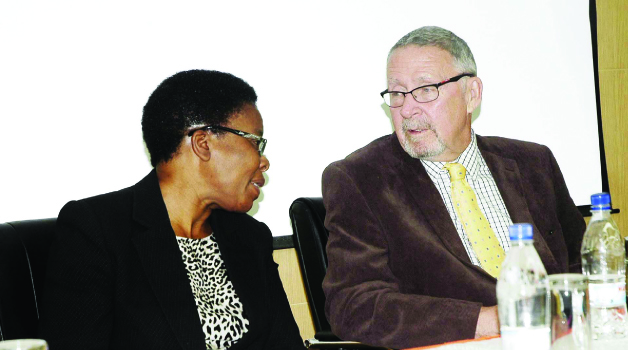
• VICE-President Guy Scott talks to Oxfam Country director Nellie Nyang’wa during the official opening of National Symposium on Climate Change Adaptation Finance at Government Complex yesterday.
By CATHERINE NYIRENDA –
VICE-PRESIDENT Guy Scott has said Zambia has failed to fully utilise funds provided by the European Union (EU) to support climate change programmes.
Dr Scott attributed the lapse to a lack of harmonised policies and coordination among stakeholders leading to the failure to spend the EU financial package to Zambia for its intended purposes.
Dr Scott said the EU had since withdrawn the balance for the funding of the climate change programmes.
He said this during the Oxfam national symposium on climate change adaptation finance, governance and accountability in Lusaka yesterday.
“I am concerned with our inability to get acts together when opportunities arise; we have a fragmented Government and hundreds of statutory bodies which are poorly coordinated such that one needs more applications to get services,” Dr Scott said.
“Last week, I had to write a letter to the EU asking them not to withdraw the money that we have been given in the last three years to spend on climate change. I had to do this for them not to take the money because we are a poor country and we need the funds.”
Dr Scott has since called for the harmonisation of polices and coordination among stakeholders in addressing concerns of climate change and environmental sustainability in the country.
He called on stakeholders to reorganise and ensure that the EU funds were released and utilised for intended purposes.
He said the same trend in Government and statutory bodies was reflecting in the non-governmental organisations (NGOs) as most of them were not transparent.
“It is very clear that we need some coordination, some business-like approach to issues, rather than many workshops and travels. Countries like Ethiopia have accumulated in excess of US$2 billion for climate change issues in their central bank whilst Zambia has not even signed the letters on the matters,” Dr Scott said.
He challenged Oxfam to consider studying programmes that the Government undertook in 1992 when the region experienced drought leading to food shortages and was prompted to import maize from the United States of America, South America and Argentina.
He said during that period, the Government managed to coordinate efforts with civil society organisations and put in place policies to address the hunger situation in the country and received commendation from the donor community for an effective approach.
Oxfam country director Nellie Nyang’wa called for the improvement in the readiness to access global funds and increase domestic financial commitments to the financial adaptation of climate change programmes.
Ms Nyang’wa said there was still fragmentation in the handling of issues of climate change despite the legal framework having been done.
She said that issues of stakeholder involvement remained a major challenge, with the need to support the framework by all.






